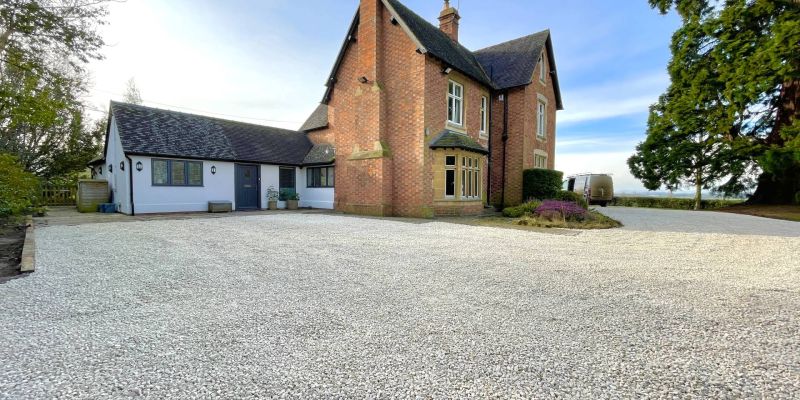
How much is a new driveway?
Blog
Have you ever looked into the cost of a new driveway? Unless you’re a specialist, it’s unlikely that you’ll know the ins and outs of what goes into planning a driveway, what costs are involved, as well as everything you need to consider to make your driveway perfect for you.
Why have a driveway?
Whether you're installing a new driveway or making changes to an existing driveway, the very existence of them makes for an excellent feature for both homes and businesses.
They make parking more safe
Driveways make parking your car more safe. You can easily install a gate or security camera, which deters thieves from targeting your vehicle.
Cheaper car insurance
Not only does a driveway guarantee higher safety for your car - having a secure parking space can also reflect on your car insurance, saving you money.
Increases property value
A driveway adds kerb appeal to a property and can increase the sale value of a home by 5-10%. A driveway adds convenience to people's lives and makes a lasting impression on a property as it's the first thing you'll see when visiting a home.
Convenience
A driveway is a great addition to a property when people are living such busy lives. A driveway is particularly great for people with mobility issues as it allows people to park right next to their homes.
What types of driveways can we have?
When considering driveway cost, one of the primary considerations will be what material we want to use. There is no right or wrong, but it is crucial to choose what driveway material works best for you with your location and size.
Tarmac Driveway

Tarmac is made from sand and crushed rock bound together with tar. A tarmac driveway is very weather resistant - suitable for conditions like storms, hail and ice. A tarmac driveway gives a nice, smooth finish, looking smart and professional.
However, tarmac driveways are weakened by car oils and spills - meaning tarmac driveway maintenance costs will need to be considered over time, with its lifespan lasting 15-20 years.
On average, tarmac driveways per square metre range from £60-80.
Asphalt Driveway
Asphalt is a material made from a mix of crushed stone, gravel sand and bitumen. Asphalt is also really hard-wearing with different weather conditions. The finish is even smoother than tarmac and is more eco-friendly.
An asphalt driveway is a great option price-wise - however, it is weaker to continuous use of car tyres over time and has a lifespan of 15-20 years.
On average, asphalt driveways per square metre can range from £60-70.
Block Paving Driveway
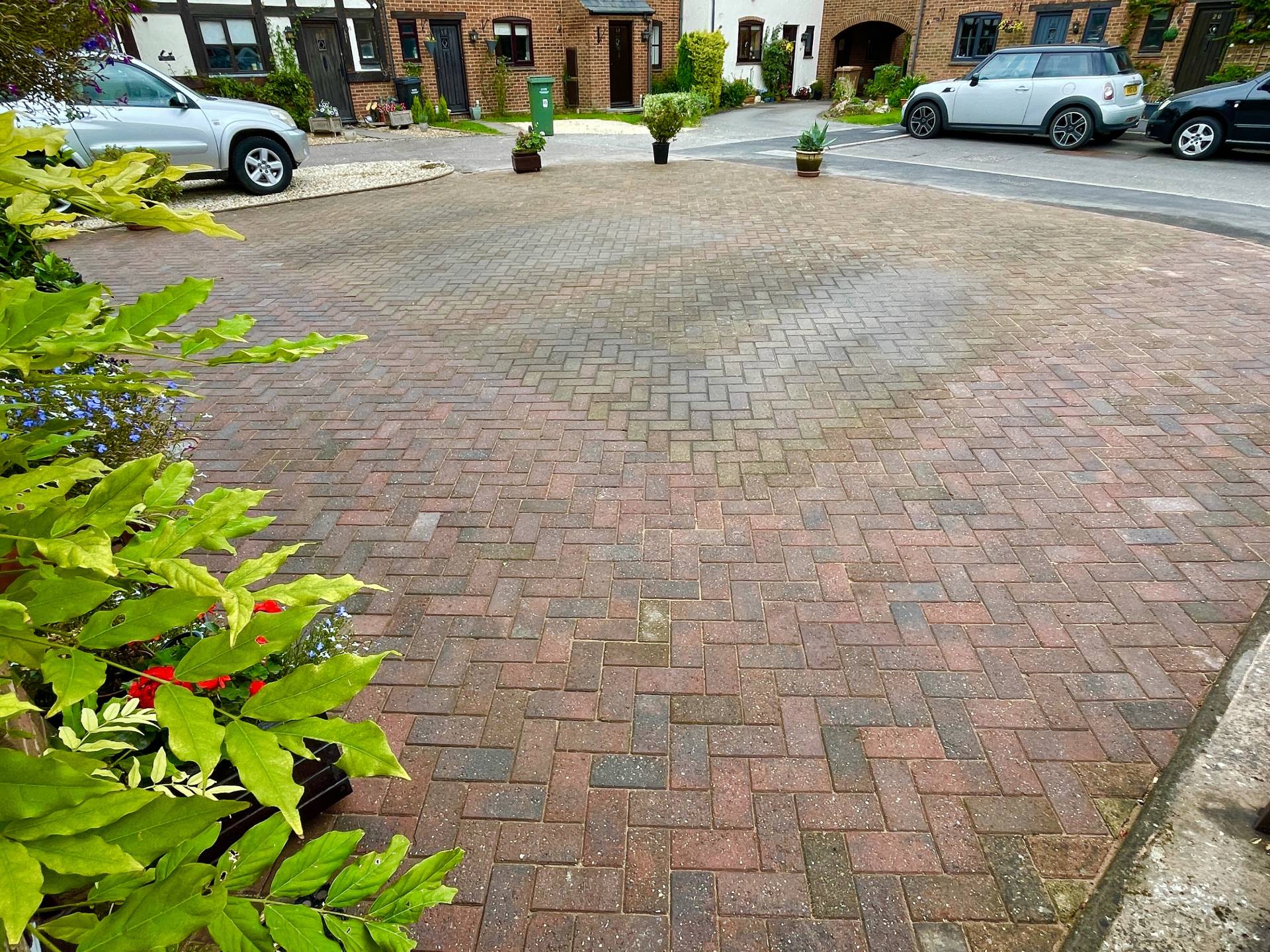
Block paving driveways use bricks over other materials to create a nice-looking or decorative driveway surface. If any blocks suffer any damage or wear, they can easily be replaced as they can be lifted.
Block paving does take quite a long time to install, and while they can be weaker to freezing weather temperatures, they are durable and can have a lifespan of at least 20-25 years with proper maintenance. You need to consider that certain bricks can be an expensive choice, especially when you look into more lavish options, e.g. cobblestone.
On average, these driveway prices per square metre can range from £80-£120
Resin Driveway
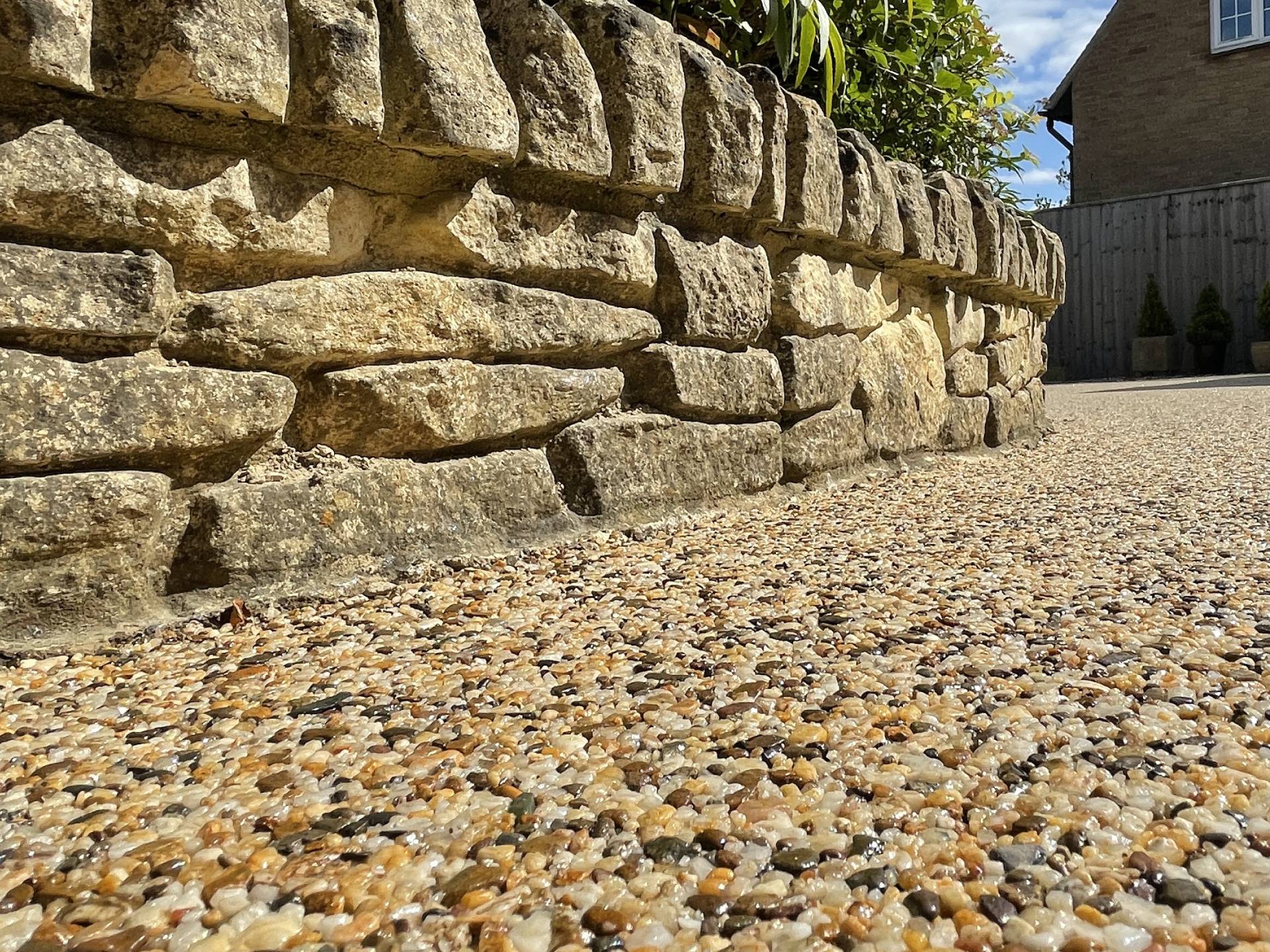
Resin driveways are made up of a mixture of aggregate stones and resin. This is an eye-pleasing option with little maintenance required. Resin driveways are great for water flow, and while the resin driveway cost can be high, they have a lifespan of up to 25 years.
In regards to resin driveway repair costs, it is rare to find cracks and damages with resin bound driveways. However, on the odd chance a resin driveway repair is needed, most companies will fix them for you at a low rate or free of charge.
On average, the cost of a resin driveway per square metre can range from £40-£70.
Gravel Driveway
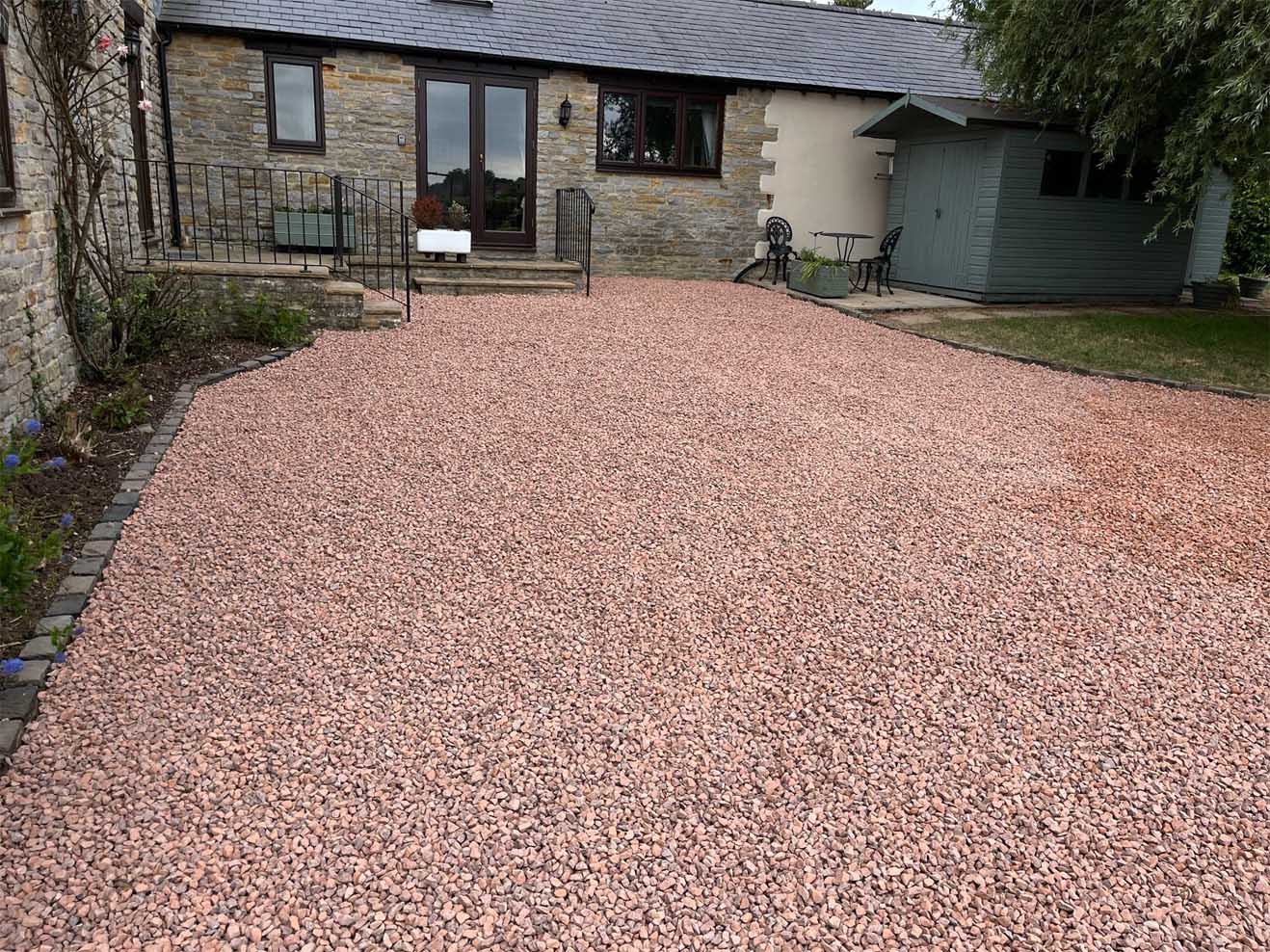
Gravel driveways are an excellent option for visual appeal and longevity. These driveways are created from a variety of loose, crushed stones - which sizes and colours can be chosen from your preference. Gravel Driveways offer excellent drainage as it does not allow rainwater to pool on the surface.
Gravel driveways cost reflect well for how long they last - with these driveways lasting decades without having to change a thing. However, you will need to maintain aspects like potholes and weeds to ensure no damage is done to any cars or surfaces from your gravel driveway.
On average, gravel driveway costs per square metre can range from £60-100.
Concrete Driveway
A concrete slab driveway uses a cast-in-place concrete, which can be coloured and imprinted to appear like other driveway varieties, e.g. brick or cobblestone.
Concrete driveways can withstand extreme weather conditions but can weaken to salt or grit/ de-icing chemicals needed with freezing weather. While they are cost-efficient in the long run - most lasting up to 50 years, the initial cost for concrete driveways can be pretty high if you have a large surface.
On average, a flat concrete driveway cost per square metre can cost anywhere from £15-25.
On average, a patterned concrete driveway cost per square metre will cost from £27-32.
Taking information from Refurbb, on average, a smaller driveway cost (11.5m²) fitting one car in the UK is as follows:
-
Tarmac - £625 - £775
-
Gravel - £475 - £1,050
-
Resin £750- £950
-
Concrete £800 - £1,200
-
Concrete Imprint £900 - £1,500
-
Paving/ Brick £1,000 - £1,500+
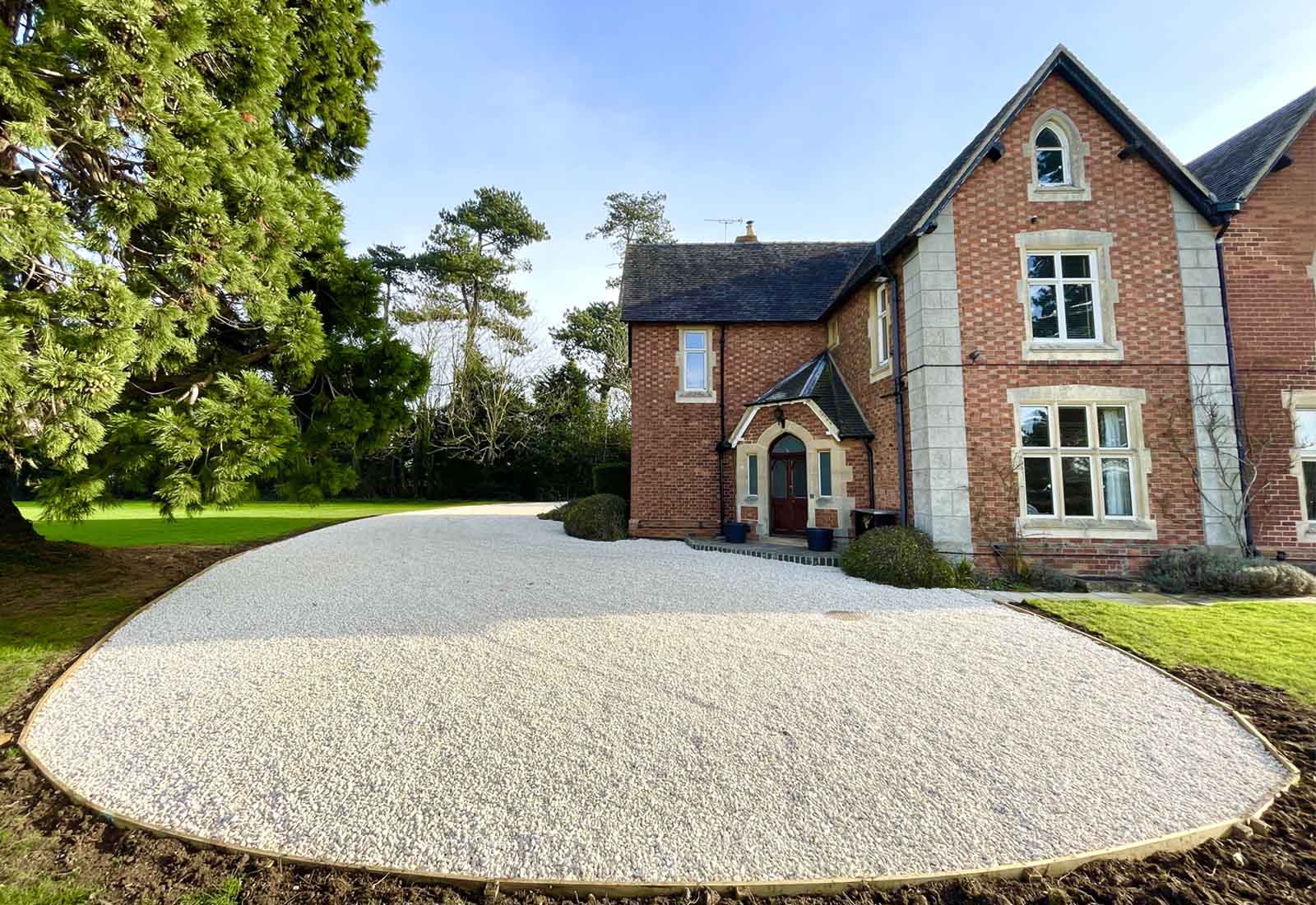
While these prices reflect averages across the UK, your regional costs can differ slightly - both material and labour costs.
What costs do we need to consider when getting a new driveway?
Size matters
Driveways come in all shapes and sizes. The dimensions of a new driveway will be a massive factor that impacts the overall cost. Larger driveways require more materials and labour, so the bigger the driveway, the harder your wallet falls.
Materials
Different types of materials can be used for a driveway - whether it’s for visual purposes or efficiency. Typically, the more common materials are asphalt, concrete, gravel pavers, resin and natural stone.
Preparation and Labour costs
Depending on the initial site where the driveway will need to be installed will impact the cost. When planning a driveway, if extensive grading is required, if the location requires special equipment or is in a difficult location, it will take more time and labour.
It is always worth noting that labour and materials can vary depending on the region and local market.
Drainage Requirements
It is essential to implement proper drainage when making a new driveway. Not only does this ensure the longevity of a driveway, but it ensures safe water flow and safety.
Design and Customisation
While this is not essential, it is important to note that if you want any design elements (e.g. decorative patterns), then this will also add cost to your overall driveway.
You want to like what you look at every day - not only for your own pleasure but for others, too.
Driveway maintenance costs
Always think about the maintenance costs that might be needed in future when having your driveway installed. Driveways do not last forever, so you'll need to set aside money in the future for any updated driveway installations and repairs. This can range from a full replacement driveway to a concrete crack filler.
Other driveway elements
When installing a driveway, one lesser priority cost to consider is the driveway entrance. Usually, this involves a driveway gate (wooden gate, metal gate, etc) as well as some security features. These can make your driveway stand out as well as add extra security.
Why is it essential to have a well-made driveway?
Don’t go into this blind. The importance of choosing the best company to help install your driveway is of high priority. It would help if you decided what are the most essential facts for you when thinking of making a new driveway.
Safety
A well-driveway ultimately needs to be made safely to ensure no damage or accidents can be made to any vehicle. A well-planned driveway will also provide appropriate drainage - which will reduce the risk of standing water or flooding.
Durability
Choosing the best materials is essential when considering the durability of your driveway. Choosing a reputable provider who uses high-quality and proper construction techniques will save you money for any repairs or replacements that could arise from certain weather conditions, potholes, cracks or other issues.
Property Value
Having a fantastic driveway will only add property to your property. It provides convenience, functionality and an attractive entrance to any well-sought property.
Is planning permission needed for a Driveway?
Considering the main costs of both the materials, paving and labour needed in order to make a new driveway, we also have to look into the laws surrounding planning permission.
In the UK, planning permission is not always needed.
Planning permission is not needed for a new or existing driveway if:
-
You’re installing or replacing a new driveway of any size using porous surfaces (which allow water to drain through) like gravel, block paving, asphalt or porous concrete.
-
If the driveway is less than 5 square metres in radius.
If the surface needing to be covered for the driveway is more than five square metres, then it will need planning permission - in the case that materials that do not provide water to run to a permeable area are being used.
You can find more information about the guidance on permeable surfacing here.
Dropped kerbs
If you want access through a footpath, you have to obtain permission from your local council to drop the kerb. This needs to be done so that any water pipes under the ground are protected, and the pavement over the top can be strengthened.
If you do need planning permission
If you fall under the category where you would need to apply for planning permission for a driveway to be built, you will need to submit an application to your local planning authority, which costs £206.
You will also need to consider the costs of your actual planning chargers - for the materials used, expertise and labour.
Make sure you have a time plan in mind, as the process can take around eight weeks from start to finish.
Are there things you can do to help your wallet?
-
Really consider what materials best work for you. All driveway materials have their pros and cons; as long as you make sure it is installed correctly, then you can be creative and open-minded in choosing your driveway material.
-
DIY: Not all stages of the driveway-making process need to be done yourself. While we recommend leaving the critical stuff to the professionals (like driveway paving), homeowners can help with costs by assisting with weeds and debris and levelling surfaces.
-
Do your research. There will be so many smaller companies on the market and different deals on materials. Find the best people and places for your budget - it might be time-consuming, but it will be worth it for the savings.
-
Really consider the size of your driveway. Cutting the size of your driveway will not only save you money on materials but also on labour costs.
So, what is there to consider?
When installing a driveway, always consider your budget, preferences and long-term goals. The prices in this article are average estimates and can vary and change depending on different requirements and locations.
Always consult with professional driveway installers to obtain detailed quotes on your requirements. While it is imperative to create an eye-pleasing driveway for your home, it is vital to ensure the safety and functions are of the highest standard. Research the best companies and professionals in your area to ensure that your driveway is installed correctly with no issues in the future.
Unless timing is a massive factor for you, it might be worth saving up a little more money and waiting to make the perfect driveway that will last you years if it’s not in your budget quite yet. Not only do you want to create a driveway that is safe and benefits your lifestyle, but you don’t want to be driving away potential home buyers with a poorly built driveway.
If you have any questions or enquiries please contact us here for more information.